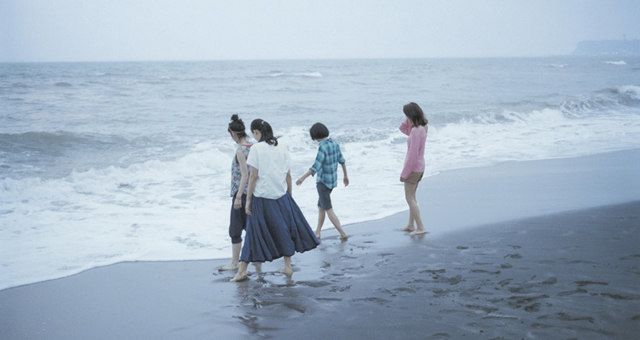
It was interesting to note the reaction, head bowed in a pained half-smile, of Japanese director Hirokazu Koreeda when hit with his first Cannes press conference question this year: “Is this an homage to Ozu?” or at least something to that extent. In fairness, it’s probably a question the man is sick of hearing at this point, but in the case of Our Little Sister it’s not quite as wayward or as ignorant as one might think. Indeed, Koreeda acknowledges as much in response: admitting to revisiting some of the master’s work in preparation for the project, or perhaps simply in preparation for such questions. And he’s right: there are similarities, and more than enough to provoke such a question. The opening shots alone of a sleepy suburban neighborhood, houses split by an unseen railway line whose heavy clients must shake these small abodes to their foundations, recall many of Ozu’s settings where industrial meets residential and communities are clustered as though huddling together for warmth. Then there is the emphasis on humans as members within the family dynamic; the role each plays, and of course the bonds that tie them together. While Our Little Sister is a film that holds up such values as tradition as important generational anchors – the annual brewing of plum wine, or a seafood curry recipe handed down from mother to daughter – it’s clear that Koreeda is not so much concerned with the traditional Japanese family as he is the non-traditional one.

Our Little Sister is at once a touching tale of both womanhood and sisterhood, centering on three siblings of varying personality – the austere one, the adventurous one, the aberrant one – who live together among the memories of a crumbling family home. The arrival of a younger half-sister provokes a sororal but also somehow maternal reaction among the trio, who are then forced to reexamine both their lives and the charred remains of the bridges burned in the past – familial pain that is glimpsed just below the formalities. While Ozu would often tackle gender roles and the expectations of men and women within Japanese society, Koreeda here saves nothing but scorn for the few male figures we encounter. The sisters’ late father is, on a handful of occasions, described as hopeless and something of a womaniser, whereas the owner of a local restaurant is portrayed as similarly insensitive. In terms of influences, one could also accuse Our Little Sister of continuing what has become something of a longstanding tradition in Japanese cinema in its centering on three (and then four) sisters. Maggie Lee refers to it as a worthy contemporary successor to Kon Ichikawa’s The Makioka Sisters in her Cannes review, but you could also go back as far as Kinuyo Tanaka’s (Ozu-scripted) The Moon Has Risen and Mikio Naruse’s Three Sisters with Maiden Hearts, or even out towards contemporary Asian cinema at large and Ang Lee’s Eat Drink Man Woman.

Our Little Sister, like Air Doll, is derived from a manga and doesn’t so much evolve as much as it does condense the themes and ideas found in Koreeda’s earlier work – particularly, the influence of parents upon children as seen in I Wish and Like Father, Like Son. Here, adultery and divorce have produced three sisters and one half-sister who come together under the same roof, with the eldest assuming a motherly role almost out of sheer resentment of her own mother’s actions. In this sense, Our Little Sister is perhaps most similar to Koreeda’s Nobody Knows, given the discarding of parental responsibility and leaving offspring to fend for themselves – though of course, in this case the children are no longer children but young women, attempting to rediscover a youth cut short and quite literally reconstruct their family home in the process. The other difference being that Our Little Sister lacks the same level of crushing realism; the same depressing inevitability, as though we are already aware how things are to pan out. Things progress almost idyllically, but we sense – especially in the occasional, moving moments of shared words over the washing of plates – that the damage has already been done. The eldest sibling in Nobody Knows attempts to hold things together for his brother and sisters but really just wants to play baseball, as any normal boy would. Here, the youngest sister shares a similar passion for football, but can’t shake the fear that her very existence is and will always be an inconvenience to someone.



